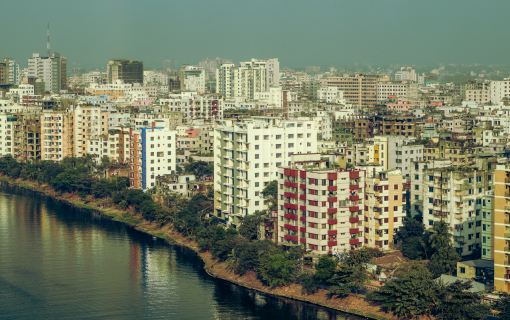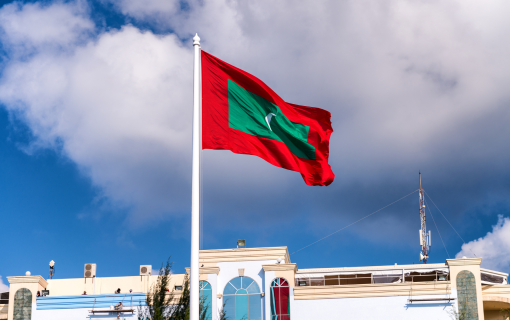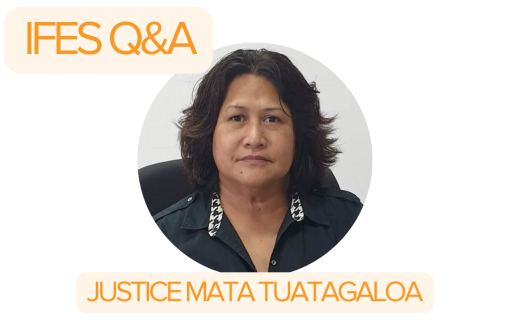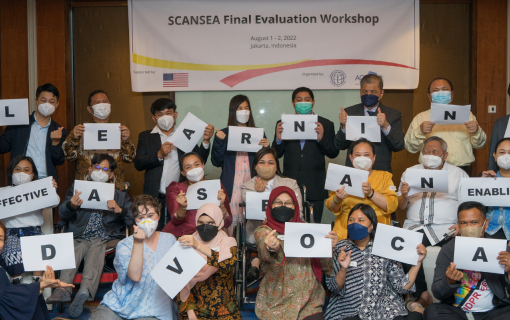Elections in Fiji: 2022 General Election
On Wednesday, Dec. 14, Fijian voters will vote to elect 55 members of Parliament for a four-year term and to confirm a new prime minister. This year, voters will choose from 343 candidates.
Fiji elects members of Parliament through a multi-member open list system of proportional representation. The total number of votes each candidate receives, representing a political party that has met the 5 percent threshold for the total number of votes cast, determines the number of seats the party wins. Independent candidates (those unaffiliated with a political party) can be elected to Parliament if the number of votes each candidate receives reaches the threshold. To be awarded a seat in Parliament, each candidate or independent candidate must receive at least 5 percent of the total votes.
To help you understand this important electoral process, the International Foundation for Electoral Systems (IFES) provides Frequently Asked Questions (FAQs) on Elections in Fiji: 2022 General Election.
Learn more about IFES' programs in Fiji and follow @IFESAsiaPacific on Twitter.
Additionally, visit IFES' Election Guide for the most comprehensive and timely verified election information available online.
Frequently Asked Questions (FAQs)
Fiji’s general election will be held on Dec. 14, 2022. The election date was confirmed Oct. 30, 2022.
The outcome of this election will confirm a new head of government and members of Parliament for a four-year term.
Citizens are voting to elect 55 members of Parliament, which is Fiji’s national legislature. The political party that controls a majority or plurality of seats will form a new government and elect a prime minister, who must be the leader of the winning party and a sitting member of Parliament.
Fiji’s government is based on the British Westminster model. Its Parliament, the only body endowed with legislative authority, comprises 55 members directly elected by Fiji’s citizens every four years. The number of seats in Parliament differs in every general election. The party with the most seats in Parliament forms a majority government or a coalition and elects a prime minister, who then forms a cabinet by nominating members of Parliament to lead the government ministries that provide government services.
The president, Fiji’s head of state, has a largely ceremonial role. The president is appointed by Parliament and must be an individual who, at the time of appointment, is not currently holding office but has, nevertheless, had a “distinguished career in any aspect of national or international life.”
Similar to Australia and New Zealand, Fiji’s judiciary is legally distinct from the legislative and executive branches, with the Supreme Court at the head. The president appoints each Supreme Court justice following consultation with the attorney general and Judicial Services Commission, a body tasked with “ensuring the efficient functioning of the judiciary.” The Judicial Services
Commission appoints judges at lower levels.
Fiji elects members of Parliament through a multi-member open list system of proportional representation. The total number of votes that each candidate receives, representing a political party that has met the 5 percent threshold for the total number of votes cast, determines the number of seats that the party wins. Independent candidates (those unaffiliated with a political party) can be elected to Parliament if the number of votes that each candidate receives reaches the threshold. To be awarded a seat in Parliament, each candidate or independent candidate must receive at least 5 percent of the total number of votes cast.
The Electoral Commission oversees elections and formulates relevant policy and regulations. It consists of seven members whom the president appoints with advice from the Constitutional Offices Commission: a chairperson who “is or is qualified to be a Judge” and six others. The commission has the authority to regulate the registration of citizens as voters and regularly revise the Register of voters; voter education; the registration of candidates for election; the settlement of electoral disputes; and the monitoring and enforcing of compliance with any written law governing elections or political parties.
The Electoral Act 2014 outlines all legal requirements for conducting and participating in elections in Fiji. The Electoral (Registration of Voters) Act 2012 outlines legal requirements for registering eligible Fijian voters and maintaining the National Register of Voters and the Political Parties (Registration, Conduct, Funding and Disclosures) Act 2013 outlines the legal requirements for administering political parties as well as the declaration of assets, liabilities and so forth.
A person who wishes to contest the election must be nominated by a political party or nominated as an independent candidate by completing a candidate nomination form and collecting signatures of support from a minimum of 1,000 registered voters.
No political party may nominate more candidates than the total number of seats in Parliament for a general election. Each party must rank candidates on its party list in the order in which they are to be assigned seats in Parliament. There are currently nine registered political parties in Fiji.
All candidates must be registered voters who have resided in Fiji for at least two years immediately preceding the election and who have not been a member of the Electoral Commission at any time in the four years immediately preceding their nomination. Additionally, all candidates must be citizens of Fiji and cannot hold dual citizenship. Lastly, they cannot have been convicted of any offense for which the maximum penalty was the imprisonment of 12 months or more within the eight years prior to nomination. Candidates must be nominated no later than 14 days after the issue of the writ of elections.
There are no seats reserved for women in Fiji’s Parliament. Fifty-six women and 287 men will contest the election.
All Fijian citizens over the age of 18 on or before Oct. 31, 2022 (the date the writ was issued) have the right to vote in the 2022 general elections and referenda, contest in elections and serve as elected officials.
Any citizen who is serving a sentence of 12 months or longer imposed by a court in Fiji or abroad, has been declared to be of unsound mind or has been disqualified from registration as a voter due to an electoral offense is not eligible to vote.
There are 693,915 registered voters in Fiji (as of Oct. 31, 2022).
Facilities provided at all polling stations must be “reasonably equipped and designed to enable persons with disabilities and other special needs” to participate and vote in secret. All polling locations are required to be accessible to ensure they are accessible for persons with disabilities. Additionally, all polling locations must have cardboard voting booths specially designed for persons using wheelchairs. Persons with disabilities are also legally permitted to choose a person of their choice (who is a registered voter) to enter the cardboard voting booth with them, should they require additional assistance in filling out their ballots. In 2022, the Fijian Elections Office (FEO), in partnership with the International Foundation for Electoral Systems (IFES) and the Pacific Community, developed a voter guide in both braille and easy-to-read formats for persons with visual impairments.
The FEO established the Elections Disability Access Working Group (EDAWG) to ensure the rights of voters with disabilities are protected and that they are represented in Fiji’s electoral processes. The EDAWG includes representatives from Fijian organizations of persons with disabilities.
Fijian citizens living abroad; registered voters who are unable to travel to a polling station due to illness, religious beliefs or work commitments; or voters under pre-trial detention or sentence of imprisonment; or voters who will not be at their usual place of residence are eligible to cast ballots via postal voting. Eligible voters must apply on the Fijian Elections Office (FEO) website once the election date is announced (Oct. 30, 2022), but no later than 5 p.m. on the 23rd day after the writ is issued (Nov. 23, 2022). The FEO must receive postal ballots by 6 p.m. on Election Day (Dec. 14, 2022).
Any person, organization or entity invited or appointed by the minister responsible for election may observe the elections.
On Election Day, votes are counted immediately following the closing of the polls at each polling station by the presiding officer and designated election officials. The presiding officer will prepare a Protocol of Results with any two election observers or polling agents as witnesses and will transmit this to the National Results Centre. The postal ballots and pre-poll ballots will be counted at the National Count Centre at 6 p.m. on Election Night.
Provisional results will be announced every half hour following the closing of the polls on the night of the election and will remain available until 7 a.m. the following day. The election results will be announced up to four days after Election Day. This timeframe is extendable if the Electoral Commission has good reasons to do so.
Electoral disputes are brought before the Court of Disputed Returns if the dispute pertains to 1) whether a person has been validly elected as a member of Parliament or 2) an application for a declaration on whether the seat of a member of Parliament has become vacant. In the case of disputes regarding the valid election of a candidate, petitions may be brought forth by voters in the district concerned, candidates in that election or the attorney general. In the case of disputes related to the declaration of a vacant seat, petitions may be brought forth by a member of Parliament, a registered voter or the attorney general.
The International Foundation for Electoral Systems (IFES) has been active in the Pacific Islands region since 2001, engaging election management bodies, public institutions, civil society, the private sector, women, young people and persons with disabilities to build resilient democracies. In Fiji, IFES is implementing Promoting Just, Engaged, Civic-minded and Transparent (PROJECT) Governance, a United States Agency for International Development (USAID)-funded partnership project with Pacific Communities through May 2026. IFES aims to strengthen democratic governance, foster consensus, promote inclusion in local communities and inspire participation in the democratic process.
These FAQs reflect decisions made by the Fijian Elections Office as of Nov. 30, 2022, to the best of our knowledge. This document does not represent any IFES policy or technical recommendations.
These FAQs are made possible by the generous support of the American people through United States Agency for International Development (USAID) and the Pacific Community. The information herein is provided by the author(s) and does not necessarily reflect the views of USAID or the United States Government.









